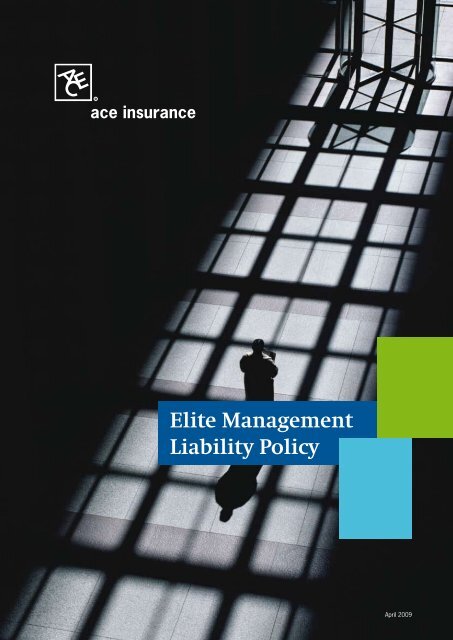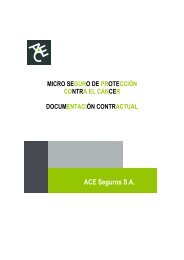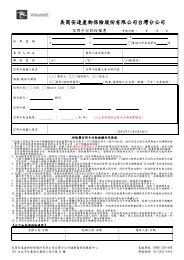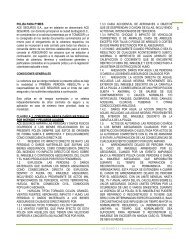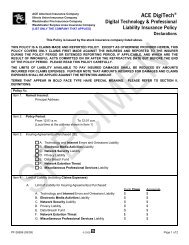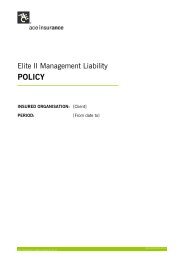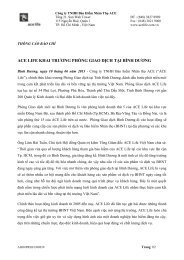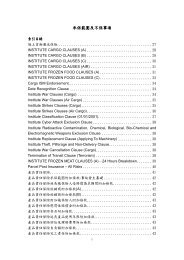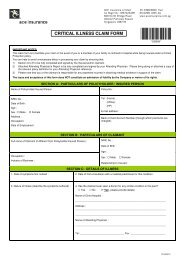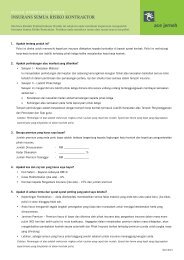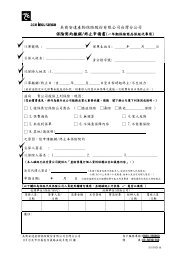Elite Management Liability Policy - ACE Group
Elite Management Liability Policy - ACE Group
Elite Management Liability Policy - ACE Group
You also want an ePaper? Increase the reach of your titles
YUMPU automatically turns print PDFs into web optimized ePapers that Google loves.
<strong>Elite</strong> <strong>Management</strong><br />
<strong>Liability</strong> <strong>Policy</strong><br />
April 2009
The <strong>ACE</strong> Insurance Limited <strong>Elite</strong> <strong>Management</strong> <strong>Liability</strong> insurance policy is specifically designed for<br />
privately owned companies. These companies and their directors, officers and employees are exposed<br />
to the legal consequences of unintended errors arising from their daily actions. The companies also face<br />
the potential exposure of financial loss caused by employee dishonesty and similar conduct.<br />
Insuring Clauses:<br />
• Directors and Officers <strong>Liability</strong> and Company Reimbursement: cover for claims against the directors,<br />
officers or employees (insured persons) of the company (insured organisation) for any actual or alleged act, error,<br />
omission, breach of duty, breach of trust, breach of authority, misstatement or misleading statement by them.<br />
• Employment <strong>Liability</strong> – Insured Organisation: cover for claims against the company by any person who was,<br />
now is or becomes during the policy period an employee for an actual or alleged employment-related breach.<br />
• Superannuation Trustee <strong>Liability</strong>: cover for claims against a trustee of a superannuation fund for any actual<br />
or alleged act, error, omission, breach of duty, breach of trust, breach of authority, misstatement or misleading<br />
statement by the trustee in that capacity.<br />
• Insured Organisation <strong>Liability</strong>: cover for claims against the company for any actual or alleged act, error,<br />
omission, breach of duty, breach of trust, breach of authority, misstatement or misleading statement by the<br />
company.<br />
• Employee Crime: cover for direct financial loss to the company resulting from a single act, or series of related,<br />
continuous or repeated acts, of fraud, dishonesty or theft committed by an employee, acting alone or in collusion<br />
with others.<br />
Additional Benefits:<br />
• Additional Excess Limit for Non Executive Directors: cover for non executive directors, in addition to<br />
the policy limit, when the limit of liability and all other insurance and avenues of indemnification have first been<br />
exhausted.<br />
• Advancement of Defence Costs and Legal Representation Expenses: defence costs and legal<br />
representation expenses are advanced to the insured as they are incurred. There is also provision for defence<br />
costs and legal representation expenses (up to 10% of the full limit of liability) to be incurred before obtaining the<br />
consent of <strong>ACE</strong>, provided <strong>ACE</strong>’s consent is obtained within 30 days of the first day on which defence costs or<br />
legal representation expenses were incurred.<br />
• Broad Definition of Insured Person: covers all past, present and future directors, officers and employees.<br />
• Broad Definition of Loss: includes cover for aggravated, punitive or exemplary damages, to the extent insurable<br />
at law and not comprising any multiplied portion.<br />
• Continuous Cover: subject to the satisfaction of certain requirements, for claims arising from circumstances that<br />
should or could have been notified under an earlier management liability insurance policy.<br />
• Costs of Defending Extradition Proceedings, Extradition Bail Bond Costs, Extradition Crisis Costs:<br />
these fall within the insuring clauses for insured persons as a result of the definition of Claim and Loss. Since the<br />
“NatWest 3” incident and the various publicised extradition proceedings from the UK to USA, directors and officers<br />
at all levels are becoming aware of the increasing possibility, and costly consequences, of attempted extradition.<br />
• Crime Costs: reimbursement to the company of any reasonable expenses (up to $25,000) paid to an investigator<br />
in establishing the existence and amount of any direct financial loss resulting from employee crime.<br />
• Crisis Loss Costs: for external crisis management services provided to and paid for by the company, to help limit<br />
the adverse financial effects on the company of any event with the potential to cause an imminent decrease of<br />
greater that 30% of the total consolidated annual revenues of the company.<br />
• Discovery Period: 84 month discovery period available in the event of an acquisition or merger of the company,<br />
in respect of conduct prior to the merger or acquisition.<br />
• Estate, Heir, Legal Representative, Spouse or Domestic Partner: cover for claims against any estate, heir,<br />
legal representative, spouse or domestic partner if the claim is made solely by reason of the estate’s, heir’s, legal<br />
representative’s, spouse’s or domestic partner’s status as such and arises directly from a covered claim made<br />
against an insured person.<br />
• Legal Representation Expenses: cover for legal representation expenses in respect of any official investigation<br />
or inquiry compelling the attendance of an insured person. It is sub-limited to $100,000 for the insured<br />
organisation but not for insured persons, and does not require an allegation of a wrongful act before it is triggered.
• Public Relations Expenses: to help limit the adverse effects of negative publicity of an insured in<br />
respect of any claim or investigation.<br />
• Non-Renewal Discovery Periods: if the policy is not renewed or replaced, the insured is<br />
automatically entitled to a discovery period of 30 days in respect of conduct prior to the expiry of<br />
the policy. Subject to the payment of additional premium, a discovery period of 12 months can also<br />
be purchased.<br />
• Occupational Health and Safety legislation: covers insured persons for defence costs and legal<br />
representation expenses for occupational health and safety matters, including for workplace deaths.<br />
• Outside Directorship Cover: covers insured persons for certain claims made against them whilst<br />
acting as a director or officer in an outside organisation.<br />
• Pecuniary Penalties: covers directors and officers for pecuniary penalties, including civil and<br />
certain strict liability offences.<br />
• Pollution Defence Costs: covers defence costs and legal representation expenses of insured<br />
persons.<br />
• Retired Directors & Officers: under the D&O cover, covers directors and officers who retire<br />
before the policy expires, for a period of 84 months after such expiry in respect of conduct<br />
occurring before such expiry provided that a discovery period is not purchasable and the policy is<br />
not renewed or replaced with another policy affording D&O cover.<br />
Claims Examples:<br />
The Claims Examples given below are illustrative, and by way of example only, and should not be<br />
taken as an indication of how a particular claim will be assessed by <strong>ACE</strong>. <strong>ACE</strong> does not represent that<br />
any future matter will be covered by the policy. Cover for a particular claim is determined by all the<br />
terms, exclusions and conditions of the policy depending on the specific facts assessed at that time.<br />
We recommend that a potential purchaser thoroughly examine our policy offered and consult with an<br />
appropriate expert to be certain about the precise scope of cover under the policy.<br />
Against Directors<br />
A lender advanced moneys to shareholders in a private company to allow the shareholders to fund the<br />
company’s business. The lender took security over the shares held by those shareholders and later<br />
exercised the securities. The directors resolved to transfer the shares to the lender under the security.<br />
The minority shareholders sued the directors for wrongful conduct. The policy met the defence costs of<br />
the directors in ascertaining whether the shares ought to be transferred back to the minority shareholders.<br />
Investigation<br />
An investigation was launched by the ACCC into the pricing practices of a group of liquor retailers. There<br />
was no allegation of a wrongful act however the investigation required the attendance of the directors of<br />
the insured. Ultimately the insured was innocent of any wrong doing however the policy paid for the legal<br />
fees incurred by the directors in obtaining advice for, and the legal representation required during, the<br />
investigation.<br />
Public Relations Expenses<br />
After the successful conclusion of the investigation referred to above the directors consulted a public<br />
relations firm to advise on how best to restore the directors’ and the company’s previously strong<br />
reputation in the community. The public relations firm put together a media campaign in local publications<br />
which made it clear that the directors and the company were not in any way involved in any price fixing.<br />
The policy paid for the costs of the public relations firm.
Employment Practices Claims<br />
1. A disgruntled employee alleged that a manager sexually harassed her and sued both the manager and the<br />
company. Ultimately the action failed however the legal costs of defence were paid by the policy.<br />
2. The company retrenched a number of staff due to a downturn in business. The method of retrenchment<br />
used by the company was on the basis of those employees that had been with the company for the least<br />
amount of time were the first to be retrenched. The retrenched employees were all women who saw this<br />
as discriminating against them based on their sex. They brought an action against the company alleging<br />
that these employment practices discriminated against women. The company was able to successfully<br />
defend the retrenchment policy however paid legal costs in defending the action. The policy indemnified<br />
the company for those costs.<br />
3. An employee brought an action against his manager and the company alleging that they did not protect<br />
him from being bullied by fellow employees. The employee claimed that despite complaints, nothing was<br />
done to prevent the bullying and that as a result he was embarrassed, no longer able to work and that<br />
it had affected his relationships with his family and friends. Although the directors of the company were<br />
not aware of the bullying, the manager and company were both found liable for not providing a safe work<br />
environment. The policy paid legal costs as well as damages in connection with the suffering incurred by<br />
the employee.<br />
Against Entity<br />
1. In the claim scenario in ‘Against Directors’ above, the company was also joined as a party to ensure that<br />
any orders were binding on it. It incurred significant costs through its participation in the litigation which<br />
were met by the policy.<br />
2. A consultant sued the company alleging that it misrepresented that it would contract with the consultant,<br />
but failed to do so, causing the consultant to turn away other work and thereby suffer economic loss. The<br />
company was found liable to the consultant and the policy met the company’s liability, including for the<br />
consultant’s costs, and the company’s own defence costs.<br />
Employee Crime<br />
1. An employee who prepared cheque requisitions forged the signature of the directors on a cheque. The<br />
cheque was made payable to the employee who used the funds to gamble. By the time the fraud was<br />
discovered the funds could not be recovered. The policy indemnified the company for its direct financial<br />
loss.*<br />
2. The owners of a retail store had suspicions that an employee who worked on the counter was stealing<br />
from the takings so they brought in an expert to investigate. The investigator was able to establish who<br />
was committing the fraud, how it was conducted and the amount defrauded. The policy indemnified the<br />
company for the loss as well as the cost of the investigator.*<br />
*In both cases it would be up to <strong>ACE</strong> to seek recovery against the employee who committed the fraud.<br />
Crisis Loss<br />
A company sought cover under the policy for the costs of retaining a crisis management expert when<br />
there was suspected product tampering that threatened the major contracts with customers. The crisis<br />
management expert was able to convince the customers that the tampering occurred after the product had<br />
left the company’s premises and did not represent a fault in the company’s production processes. The policy<br />
indemnified the company for the costs of the expert.
Occupational Health and Safety<br />
An employee was killed in the carrying out of his work duties as a result of a live electrical wire in the employer’s<br />
premises. Workcover commenced an investigation and later a prosecution of the company and 2 directors for failing to<br />
have in place a safe work environment in breach of occupational health and safety legislation and regulations. The policy<br />
met the directors’ costs of representation for the investigation and prosecution.<br />
Outside Directorship - Non Profit Organisation<br />
A company required one of its directors to sit on the board of an incorporated not-for-profit entity as part of its<br />
contribution to the activities of that entity. Some of the members then claimed that the board of the entity incorrectly<br />
disbursed the funds available to the entity for its objectives. The costs of the company’s director were met under the<br />
Outside Directorship extension of its <strong>Management</strong> <strong>Liability</strong> policy.<br />
Pecuniary Penalties<br />
1. In the Occupational Health and Safety scenario referred to above, orders were made for improvements to the<br />
work place and systems for ensuring safety. When those improvements were not completed by the time a further<br />
inspection occurred (through an explicable oversight), proceedings were taken and pecuniary penalties were imposed<br />
on the directors for breach of provisions in the relevant OH&S legislation. The policy met the penalties imposed on<br />
the directors and the defence costs of the proceedings.<br />
2. A manufacturing company accidentally had a spill of harmful waste from its factory. The Environment Operations<br />
Act (NSW) imposed liability on the company and its directors for spillage and waste disposal. Penalties of up to<br />
$500,000 were possible for the directors, but the penalty imposed was $200,000. The spillage also caused<br />
pollution to a nearby waterway, putting the directors at risk of a further penalty of up to $250,000 and $60,000 for<br />
each day the offence continued. A further penalty of $200,000 was imposed. The policy indemnified the directors for<br />
the penalties.<br />
Pollution Defence Costs<br />
The defence costs of the directors in the pecuniary penalty proceeding under the Environmental Operations Act above<br />
were met by the policy. The policy also met the legal costs of the directors in obtaining advice during the investigation<br />
which preceded the penalty proceeding.<br />
Retired Directors & Officers<br />
A director retired from the board and sold his equity stake to the remaining directors. At renewal of the policy the<br />
remaining directors decided not to renew the policy in order to save on expenses. Five months later the company<br />
was placed in the hands of administrators who brought an action against the directors (including the retired director)<br />
for trading whilst insolvent. Ultimately the retired director was innocent of any wrong doing however the policy paid<br />
for the legal fees incurred in successfully defending the allegation of insolvent trading made against him (and the legal<br />
representation expenses incurred in the examinations conducted by the administrators before the proceedings were<br />
commenced).<br />
About <strong>ACE</strong>:<br />
The <strong>ACE</strong> <strong>Group</strong> of Companies® is a global leader in insurance and reinsurance serving a diverse group of clients. Zurich-based parent<br />
company <strong>ACE</strong> Limited has the A+ financial strength rating by both Standard & Poor’s and AM Best. This rating is indicative of <strong>ACE</strong>’s<br />
strong capital base and financial stability; key attributes in the business of risk. With a history dating back to 1792, the members of the<br />
<strong>ACE</strong> <strong>Group</strong> have offices in more than 50 countries and a strong presence in Asia Pacific.<br />
<strong>ACE</strong> Australia delivers a broad range of quality risk products and exceptional service to large corporates and small to medium<br />
businesses. In Australia, <strong>ACE</strong> has wealth of on-the-ground expertise backed by the organisation’s global reach and breadth of<br />
resources. With over 50 years of operation in the Australian market, <strong>ACE</strong> is a major supplier of insurance protection to many of the<br />
country’s largest companies.<br />
Additional information can be found at: www.aceinsurance.com.au.
Contacts:<br />
Grant Cairns<br />
National Financial Lines Manager (Australia / New Zealand)<br />
Tel: 02 9335 3266<br />
Email: grant.cairns@acegroup.com<br />
Neil Sheppard<br />
National SME Manager & PI Product Head<br />
Tel: 03 9623 7236<br />
Email: neil.sheppard@acegroup.com<br />
Alistair Sandilands<br />
National Corporate Manager & D&O Product Head<br />
Tel: 02 9335 3473<br />
Email: alistair.sandilands@acegroup.com<br />
Michael Eastmure<br />
Southern Region Financial Lines Manager<br />
Tel: 03 9623 7226<br />
Email: michael.eastmure@acegroup.com<br />
Ben Carey<br />
New South Wales Financial Lines Manager<br />
Tel: 02 9335 3245<br />
Email: benjamin.carey@acegroup.com<br />
Liam Burrell<br />
Queensland Financial Lines Underwriting Manager<br />
Tel: 07 3018 5815<br />
Email: liam.burrell@acegroup.com<br />
Justin Klietz<br />
Western Australia Financial Lines Underwriting<br />
Manager<br />
Tel: 08 9223 0104<br />
Email: justin.klietz@acegroup.com<br />
Adam O’Brien<br />
South Australia Financial Lines Underwriter<br />
Tel: 08 8418 3008<br />
Email: adam.obrien@acegroup.com<br />
Important Note:<br />
This brochure is intended to provide only a general description of the insurance policy (<strong>ACE</strong> <strong>Elite</strong> <strong>Management</strong> <strong>Liability</strong> ed. 10/07) and is not<br />
intended to modify the actual provisions of the wording. The Claims Examples given above are illustrative, and by way of example, only and<br />
should not be taken as an indication of how a particular claim will be assessed by <strong>ACE</strong>. <strong>ACE</strong> does not represent that any future matter will be<br />
covered by the policy. Cover for a particular claim is determined by all the terms, exclusions and conditions of the policy depending on the<br />
specific facts assessed at that time. We recommend that a potential purchaser thoroughly examine our policy offered and consult with an<br />
appropriate expert to be certain of the precise nature of its details. Potential purchasers should contact their broker and / or insurance agent<br />
for further advice.


